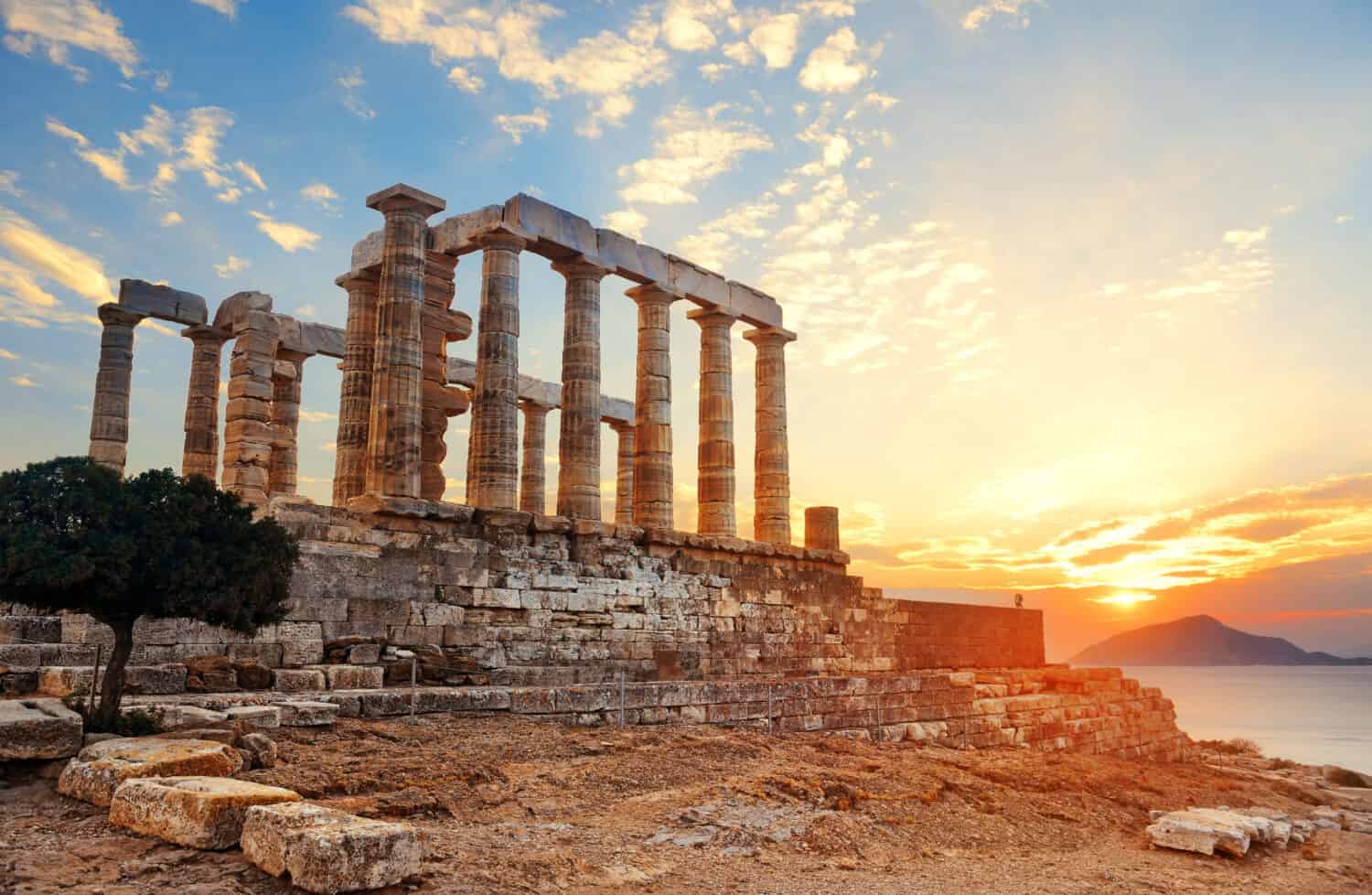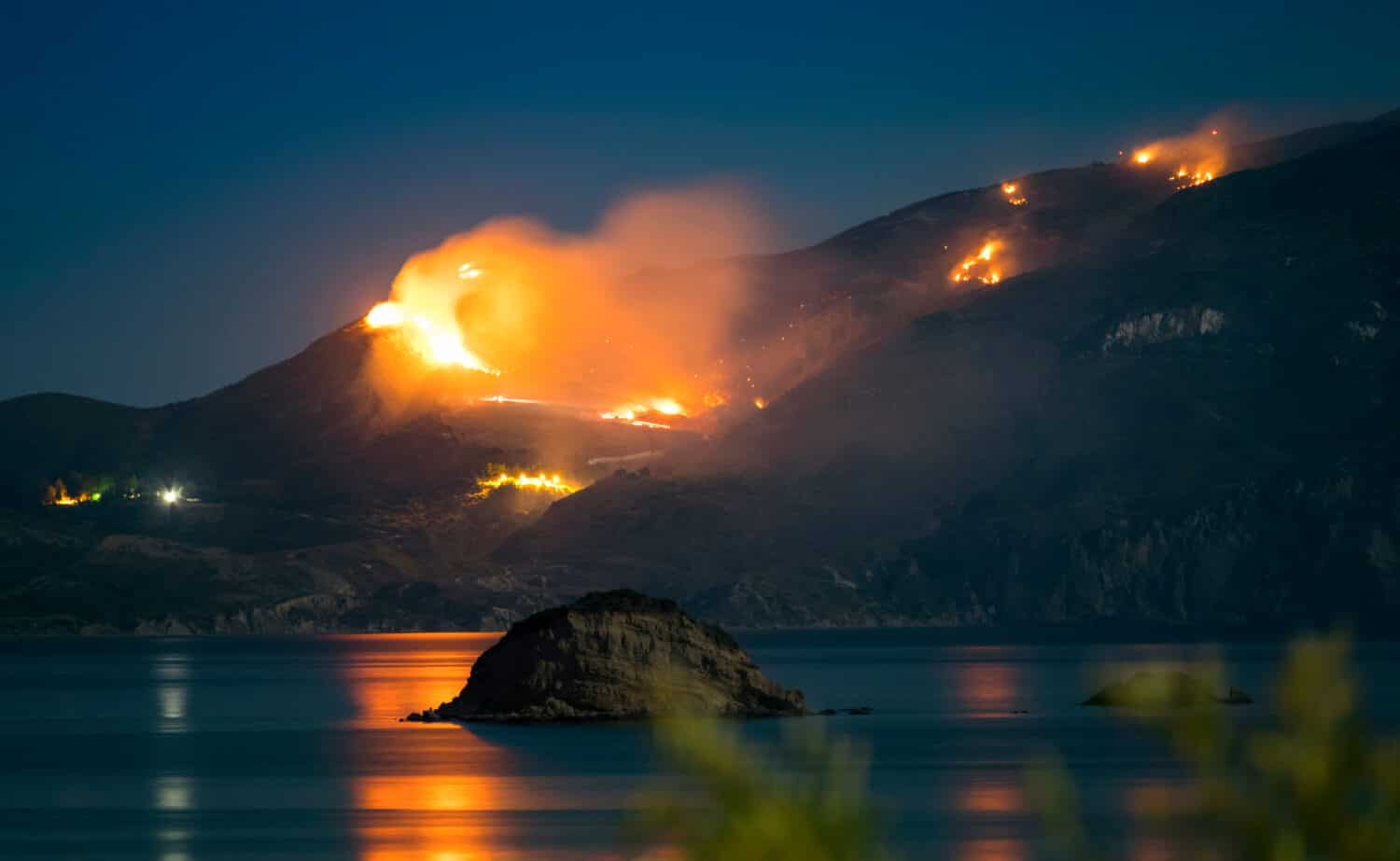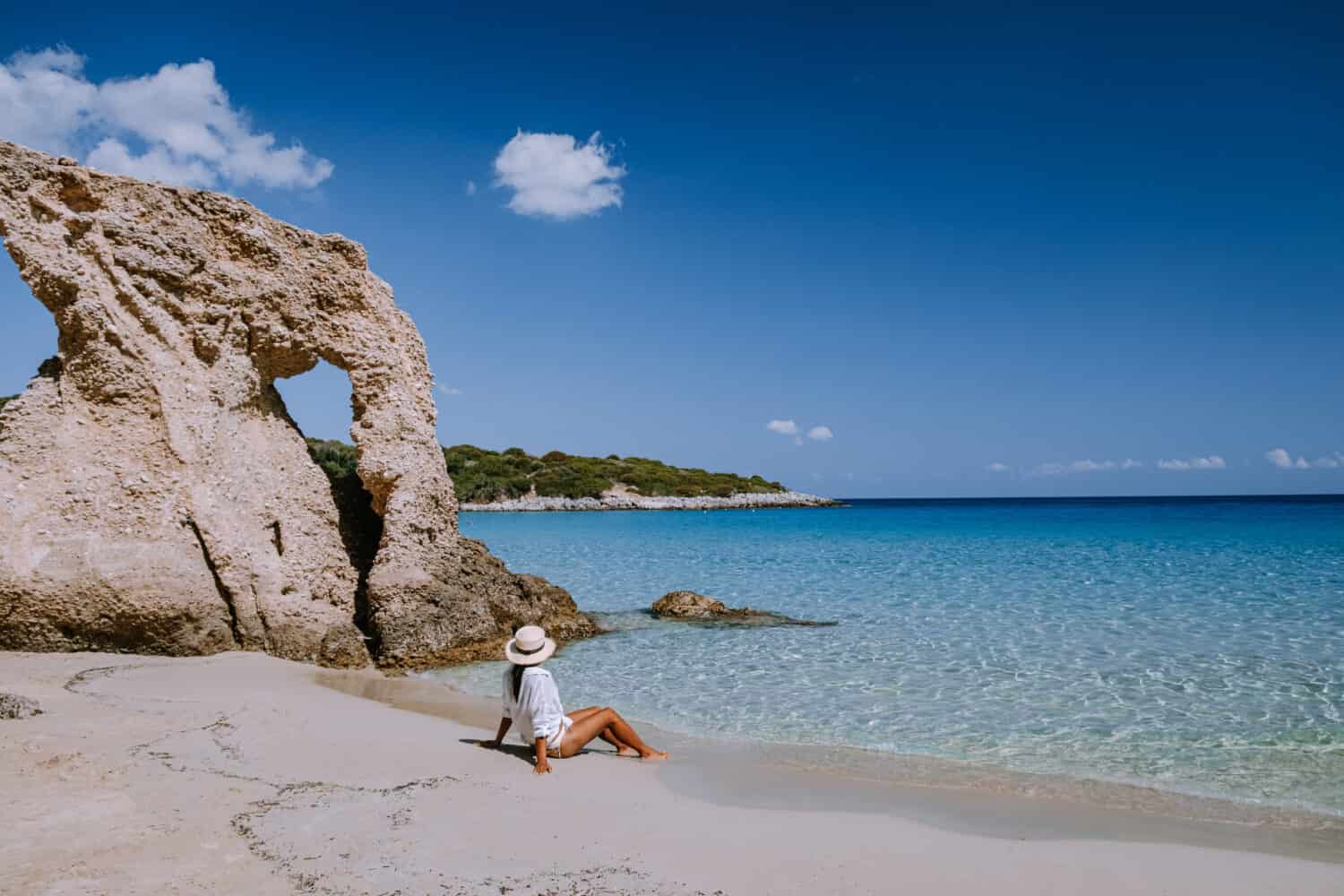August, the peak of summer, invites travelers to explore the enchanting beauty of Greece. With its Mediterranean climate, this captivating country offers warm and pleasant weather, making it an ideal time for visiting. Greece hosts a diverse range of landscapes, from gorgeous beaches and crystal-clear waters to ancient ruins and vibrant cities. The August weather in Greece sets the stage for hot days and clear skies.
As a Mediterranean destination, Greece experiences long hours of sunshine and primarily comfortable temperatures during August. However, specific figures vary depending on the region, with the coast slightly warmer than the inland mountainous regions.
Whether it’s lounging on incredible beaches or savoring the flavors of Greek cuisine, August is an exceptional time to experience the allure of Greece, thanks to the favorable weather. With its captivating landscapes, rich heritage, and welcoming atmosphere, Greece in August promises an unforgettable journey filled with sunshine, adventure, and cultural immersion.

Greece receives up to 14 hours of sunlight in August.
©KellySHUTSTOC/Shutterstock.com
Average August Weather in Greece
Greece, a stunning country known for its rich history, breathtaking landscapes, and idyllic islands, enjoys a diverse Mediterranean climate. The weather in August, during the peak of summer, is generally one of the warmest months filled with sunshine, offering ideal conditions for outdoor activities and beachside relaxation. This article will delve into the typical August weather in Greece, including the hottest on record, average temperatures, humidity, precipitation, visiting Greece in August, and more.
Precipitation
August is generally a dry month in Greece, with limited rainfall compared to the winter and spring months. However, there may still be occasional showers or thunderstorms, particularly in the mountainous areas or northern regions. On average, August’s rainfall ranges from 0.2 to 1.5 inches across the country. The mountainous areas tend to receive the majority of the rain during August.
Wind Patterns
Greece experiences different wind patterns depending on the region. The Meltemi winds, a northerly wind that blows from the Aegean Sea, are more prevalent in the summer months, including August. These winds can provide relief from the summer heat, particularly in the islands, while also creating favorable conditions for sailing and wind-related water sports.
Storms
While Greece does not typically experience severe storms in August, occasional thunderstorms can occur, mainly in mountainous areas or during weather system transitions. Thunderstorms are usually short-lived but may bring short bursts of heavy rain, gusty winds, and lightning. However, these storms are infrequent and do not significantly impact the overall weather patterns during this month.
Heat Waves
August is notorious for heat waves in Greece. High-pressure systems can result in prolonged periods of scorching temperatures, especially in the mainland and southern regions. During heat waves, temperatures can soar above 40 degrees Celsius (104 degrees Fahrenheit), increasing the risk of heat-related health issues. Staying hydrated, seeking shade, and following local advisories during such periods is essential.
Cloud Cover and Sunshine
August offers ample sunshine throughout Greece, making it a popular sunny destination. The skies are generally clear or partly cloudy, allowing visitors to enjoy long hours of sunlight. On average, Greece receives close to 14 hours of sunshine daily during August, providing an excellent opportunity to explore the country’s ancient ruins, picturesque landscapes, and pristine beaches.
Humidity
In August, humidity levels in Greece can vary across different regions. The coastal areas and islands tend to experience higher humidity, particularly during heat waves, when moisture from the surrounding seas contributes to increased humidity levels. However, overall humidity levels in Greece during August are relatively low to moderate, with the Mediterranean climate providing locals and visitors a pleasant and comfortable atmosphere.
Sea Temperatures
During August, the sea temperatures in Greece are warm and inviting, ranging from 24 to 28 degrees Celsius (75 to 82 degrees Fahrenheit). These comfortable water temperatures make swimming and various water activities enjoyable, attracting beach enthusiasts worldwide.
Notable Rainfall Records
Rain is not common in Greece during August. However, there are notable records from this month. The highest rainfall records in Greece during August also vary across different regions.
A notable example across the mainland included Crete in August 2010. Parts of Crete witnessed intense rainfall, leading to flash floods. The town of Agios Nikolaos reported a daily rainfall record of 135 millimeters (5.3 inches), resulting in localized damage and challenges for residents and tourists.
Greece is a Popular Summer Destination
August in Greece is synonymous with long sunny days, high temperatures, and an inviting Mediterranean climate. While rainfall is generally limited during this time, occasional showers or thunderstorms may occur, primarily in the mountainous areas or northern regions. Visitors can expect warm weather, clear skies, and ample sunshine, making it an ideal time to explore Greece’s stunning landscapes, ancient sites, and picturesque islands. However, staying aware of the potential for heat waves and occasional thunderstorms during this period is crucial.

In August, temperatures in Greece range between 68 to 104 degrees depending on the time of day or night as well as location.
©Dmitry Rukhlenko/Shutterstock.com
Average and Record Temperatures
August, the peak of summer, showcases warm and inviting temperatures in Greece. This makes August an ideal time for outdoor adventures and beachside retreats. The Average temperatures in August vary depending on location.
Average Temperature Across the Mainland and Northern Regions
August brings warm temperatures in mainland Greece and the northern regions, creating a pleasant ambiance for travelers and locals alike. During the day, average temperatures range from 30 to 35 degrees Celsius (86 to 95 degrees Fahrenheit). Evenings offer some respite as temperatures dip slightly, typically ranging from 20 to 25 degrees Celsius (68 to 77 degrees Fahrenheit).
Average Temperature Across the Southern Regions and Islands
Greece’s southern regions and islands experience even higher temperatures in August, reflecting the quintessential Mediterranean climate. Daytime temperatures can soar to 35 to 40 degrees Celsius (95 to 104 degrees Fahrenheit), providing ample opportunities for sun-soaked activities. The nighttime temperatures in these regions range from 25 to 30 degrees Celsius (77 to 86 degrees Fahrenheit), ensuring warm evenings under the starry skies.
Hottest and Coldest Temperature Records
Hottest Temperature Record
One of the highest recorded temperatures in Greece during August was on August 23, 1958, in Trikala (Thessaly). On that scorching day, the temperature soared to a sweltering 47.2 degrees Celsius (117.0 degrees Fahrenheit). This exceptional record highlights the intensity of heat waves that Greece can experience during summer. The hottest recorded temperature ever occurred on July 10, 1977, in Elefsina, a city located near Athens. That day, temperatures reached 48 degrees Celsius (118.4 degrees Fahrenheit).
Coldest Temperature Record
According to unofficial records, the coldest temperature recorded in Greece during August was 10 degrees Celsius (50 degrees Fahrenheit). However, we do know Greece’s coldest recorded temperature outside of August. It occurred on January 27, 1963, in the village of Ptolemaida (Macedonia) in the Kozani regional unit. During that winter day, the temperature dropped to a bone-chilling -27.8 degrees Celsius (-18 degrees Fahrenheit). Although this record belongs to a winter month, it demonstrates the wide range of temperatures that Greece can experience throughout the year.

Greece is filled with historical experiences.
©Songquan Deng/Shutterstock.com
Natural Disasters in Greece During August
Although August has hot and pleasant weather, it is important to be aware of potential natural disasters that can occur during this time of year.
Heat Waves
Extreme heat waves are considered natural disasters. Greece is susceptible to heat waves during the summer months, including August. High-pressure systems can bring extended periods of intense heat, with temperatures exceeding 40 degrees Celsius (104 degrees Fahrenheit) in some regions. Heat waves pose risks to human health, including heat exhaustion and heatstroke. It is crucial to stay hydrated, seek shade, and follow any heat advisories issued by local authorities.
Wildfires
August presents an increased risk of wildfire due to the combination of high temperatures, dry vegetation, occasional strong winds, and even arson. In recent years, Greece has faced devastating wildfires during this month each year, causing significant damage to natural landscapes and posing risks to human settlements. Vigilance, adherence to fire safety regulations, and promptly reporting any fire hazards are vital in mitigating the impact of forest fires.
Earthquakes
Greece resides in a seismically active region, and earthquakes can occur at any time of the year. Greece’s geological position exposes it to the risk of seismic activity year-round, including in August. Authorities monitor seismic activity in Greece. The country has implemented measures to ensure that buildings and infrastructure are to code to withstand earthquakes.
The Worst Natural Disaster in Greece During August
One of the most significant natural disasters to occur in Greece during August was the 2021 Greece wildfires. From August 3 to September 3, 2021, there were over 140 fires that burned across the country, with the largest wildfires in Attica, Olympia, and Messenia and the most destructive in northern Euboeaa. From the start of August, the fires quickly spread, fueled by strong winds and dry conditions, resulting in the loss of lives, destruction of more than a dozen homes, and extensive environmental damage. The tragic event highlighted the destructive potential of wildfires and the importance of effective firefighting and emergency response measures. Approximately 125,000 hectares (308,882 acres) of forest and arable land were affected. The leading cause was likely arson, and it was considered the worst wildfire season since the 2007 Greek forest fires. In the end, there were numerous injuries and three fatalities reported.
While Greece typically enjoys warm and pleasant weather in August, it is essential to be aware of potential natural hazards that can occur. Heat waves, wildfires, and earthquakes are among the natural disasters that Greece may face during this month. Vigilance, preparedness, adherence to safety measures, and prompt response to any warnings or advisories are crucial in mitigating the impact of these events.
Who Manages Natural Disasters in Greece?
The General Secretariat for Civil Protection collaborates closely with various governmental bodies, local authorities, and relevant stakeholders to develop strategies, establish emergency response protocols, and coordinate disaster management operations. It monitors and assesses risks, provides early warning systems, and ensures the preparedness of response mechanisms.
During emergencies, such as natural disasters, the General Secretariat for Civil Protection activates the National Emergency Plan and coordinates the national, regional, and local response efforts. It works in tandem with emergency services, including fire departments, police, and medical services, to ensure a coordinated and effective response to protect lives, property, and the environment.

Wildfires are most common during August in Greece.
©Burben/Shutterstock.com
Visiting Greece in August
August is a favorable time to travel to Greece, offering warm weather, clear skies, and many cultural experiences. However, it is wise to consider the high tourist influx and plan accordingly to ensure a smooth and enjoyable trip. With its stunning beaches, rich history, and vibrant festivities, Greece beckons travelers worldwide to experience the magic that unfolds during this captivating month.
Tourism and Attractions in Greece During August
Beaches and Outdoor Activities
In August, Greece’s stunning beaches and islands are a significant draw for tourists. The combination of warm temperatures, crystal-clear waters, and picturesque coastlines creates a perfect setting for beach lovers and water enthusiasts. From the renowned beaches of Mykonos and Santorini to the hidden gems of Crete and Rhodes, Greece offers an array of breathtaking destinations for relaxation.
The delightful August weather in Greece sets the stage for indulging in beach activities and exploring the country’s picturesque landscapes. Greece boasts a diverse coastline with crystal-clear waters. Whether one prefers sunbathing, swimming, sailing, or engaging in water sports like snorkeling or diving, August offers ideal conditions to enjoy the coastal beauty and immerse oneself in the refreshing Mediterranean waters.
Cultural and Historical Sites
Greece’s rich history and cultural heritage provide rich experiences. August offers an excellent opportunity to explore its iconic archaeological sites and landmarks. From the Acropolis in Athens to the ancient ruins of Delphi and Olympia, visiting these sites during the warm summer months allows for comfortable exploration without excessive layers of clothing or unfavorable weather conditions.
Greece’s ancient history and archaeological treasures also make it a captivating destination year-round. However, August offers the advantage of pleasant weather, allowing visitors to explore the ancient ruins, temples, and historic sites comfortably. The juxtaposition of the warm summer air with the grandeur of structures like the Parthenon or the Palace of Knossos enhances the overall experience.
Festivals and Events
August in Greece is not just about natural beauty and historical landmarks but also a time of celebration and cultural immersion. The country comes alive with vibrant festivals, music, dance, and traditional gastronomy. Attending these events allows visitors to connect with the local culture, witness age-old traditions, and create memories that highlight the unique spirit of Greece.
The most notable celebration is the Assumption of the Virgin Mary on August 15, a significant religious holiday. Festivals and processions occur across the country, allowing visitors to witness traditional Greek customs, music, dance, and delectable local cuisine. It’s an opportunity to immerse oneself in the vibrant Greek culture and create lasting memories.
Tourist Influx
August is one of the busiest months for tourism in Greece. It coincides with many countries’ peak summer holiday period, leading to a significant influx of visitors. Popular tourist destinations such as Athens, Santorini, Mykonos, and Crete experience a high volume of tourists during this time. Travelers should plan for larger crowds at popular attractions, longer queues, and higher demand for accommodations and services.
Advance Planning
Due to the popularity of Greece as a summer destination, it is advisable to plan and book accommodations, flights, and activities well in advance, especially during August. With increased demand, availability may become limited, and prices can rise. By planning, travelers can secure their preferred accommodations and enjoy a smoother and more enjoyable experience during their visit.

Greece is a popular tourist destination in August.
©Natalia Dobryanskaya/Shutterstock.com
Conclusion
August is an enticing time to travel to Greece, offering warm temperatures, clear skies, and ample exploration and relaxation opportunities. With its Mediterranean climate, Greece presents a delightful blend of sunshine and pleasant weather during this month. Visitors can expect daytime temperatures ranging from 30 to 35 degrees Celsius (86 to 95 degrees Fahrenheit) in mainland and northern regions. In contrast, southern regions and islands may experience even higher temperatures, reaching 35 to 40 degrees Celsius (95 to 104 degrees Fahrenheit).
Greece’s stunning beaches, ancient historic sites, and vibrant cultural festivities make it a popular destination during August. Travelers can indulge in sun-soaked beach activities, explore iconic archaeological sites, and immerse themselves in the rich traditions that characterize Greek culture. However, it is important to consider the higher tourist influx during this peak season and plan to secure accommodations and avoid long queues at popular attractions.

Greece has plentiful white sandy beaches.
©fokke baarssen/Shutterstock.com
Thank you for reading! Have some feedback for us? Contact the AZ Animals editorial team.







